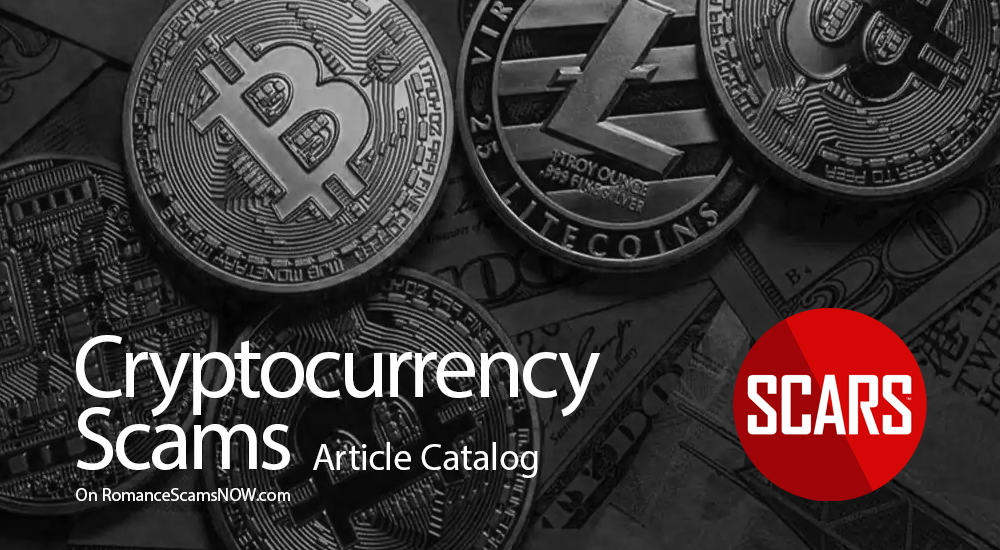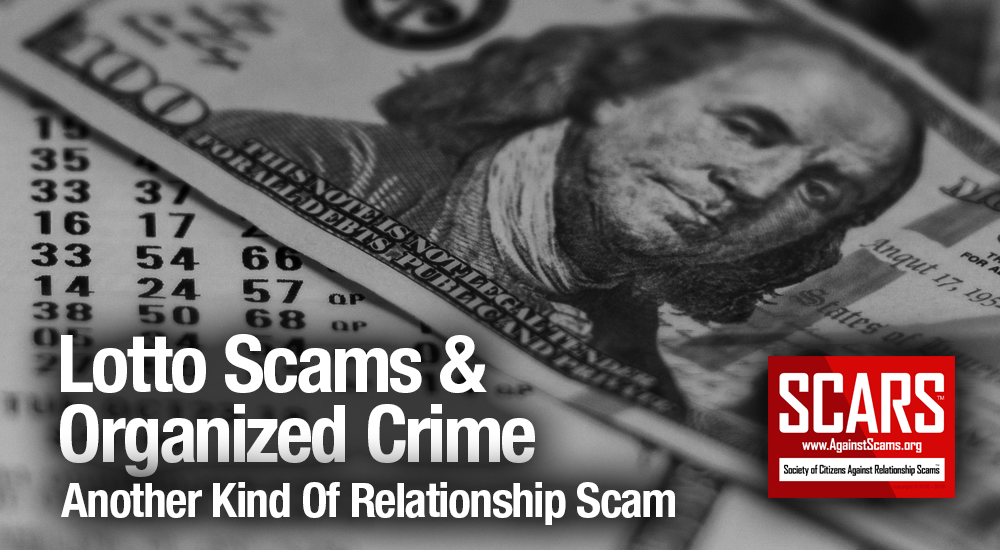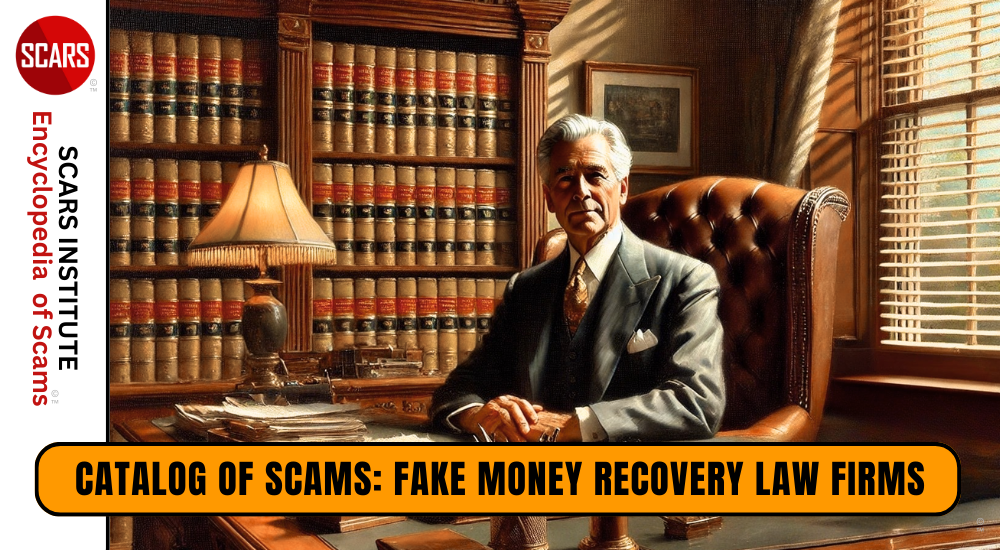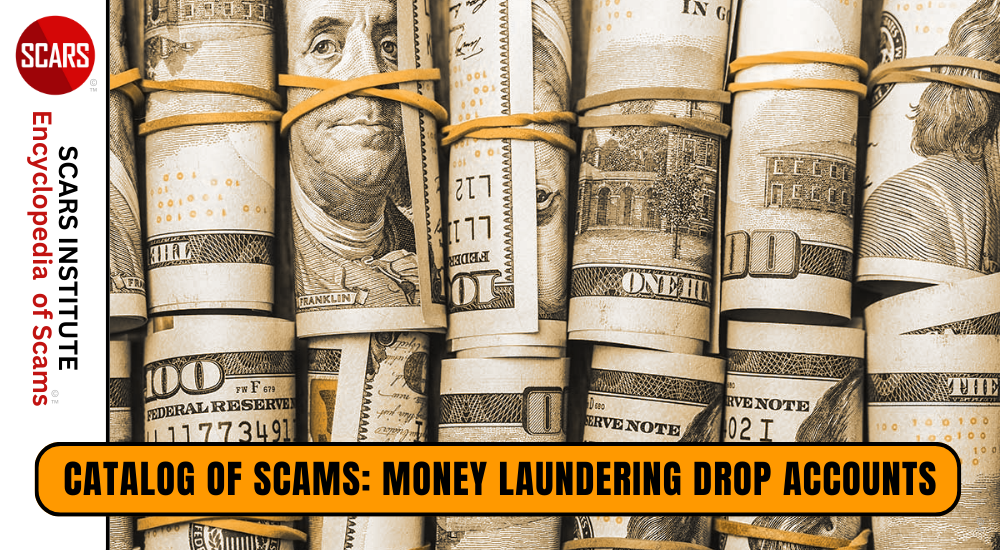
SCARS Institute’s Encyclopedia of Scams™ Published Continuously for 25 Years

You’ve Won the Lotto!
Say you hear or read the words: “You’ve won the Lotto!” What will you do with your winnings?
Who wouldn’t be excited to win a prize, sweepstakes, or lottery (lotto)? But…did you actually win? And how do you know?
Sweepstakes, prize, and lottery frauds are among the top scams people report to the Federal Trade Commission and the sizes of the losses are similar to romance scams.
What Is A Lotto Scam?
A lotto (lottery) or sweepstakes scam is a type of financial fraud in which scammers (criminals) deceive victims by promising them a large sum of money in exchange for a small fee or personal information. The scammers often pretend to be representatives of a well-known lottery or sweepstakes company to appear legitimate.
Surprisingly, Jamaica and the Dominican Republic seem to be the world headquarters for this type of scam. But criminals from China to India to Brazil to Africa engage in these crimes too.
Types Of Lotto Scams
There are several common types of lottery scams that scammers use to deceive victims. Here are some of the most typical ones:
- Advance fee scams: This is one of the most common lottery scams, where scammers tell victims that they have won a lottery but need to pay an advance fee to receive the winnings. The scammer may claim that the fee is for taxes, processing, or handling charges.
- Fake check scams: In this type of scam, the scammer sends a check to the victim, claiming that it’s their lottery winnings. The check is usually for a large amount, and the scammer asks the victim to deposit the check and then send them a portion of the money back. However, the check is fake, and once the victim sends the money, they discover that the check has bounced.
- Email and text message scams: Scammers send emails or text messages to victims, claiming that they have won a lottery. They ask the victim to reply to the message with their personal information or to click on a link that takes them to a fake website where they can enter their details.
- International lottery scams: In these scams, scammers claim that the victim has won a foreign lottery and ask them to pay fees to claim the winnings. The scammer may also ask the victim to travel to a foreign country to collect the prize, but once they arrive, they find that there is no lottery and they have been scammed.
- Winning number scams: In this type of scam, scammers call victims to tell them that they have won a lottery but need to provide their winning numbers to claim the prize. The scammer may then use the numbers to access the victim’s bank account or steal their identity.
How These Loto & Sweepstakes Scams Work:
The scam typically begins with an email, phone call, or letter informing the victim that they have won a large sum of money in a lottery or sweepstakes, even though they never entered it. The scammer will then ask the victim to pay a small fee, usually for taxes or administrative costs, in order to claim the prize. Alternatively, they may ask for personal information, such as bank account or credit card details, in order to process the winnings.
Once the victim pays the fee or provides their personal information, the scammers disappear and the victim never receives the promised winnings. In some cases, the scammers may even ask for more money or information, claiming that there are unexpected fees or complications.
If the scammers sent a fake check to the victim and they deposited it, usually sending a portion to the scammers afterward, the victim will then be liable for whatever they withdrew and sent to the scammers, plus bank fees. And this was a bad check, it is usually a violation of law too!
The Impact On Victims Of Lotto Scams
Remember, these scams usually start with a call or message that says you’re a winner. (obviously a lie.) They say to get the so-called prize you have to send money or click somewhere to give your information. Don’t. The most recent FTC data shows people reported losing $301 million to this type of fraud. That’s an average loss of $907 per person.
The impact on victims can be devastating, both financially and emotionally. They may lose a significant amount of money, and the personal information they provided may be used for further fraudulent activities. Victims may feel embarrassed or ashamed about falling for the scam, and it can damage their trust in others.
What To Know About Real Contests and Prizes
Plenty of contests are run by reputable marketers and non-profit organizations. But there are some things to know before you drop in a quick entry or follow instructions to claim a prize.
- Real sweepstakes are free and by chance. It’s illegal to ask you to pay or buy something to enter or to increase your odds of winning.
- Contest promoters might sell your information to advertisers. If you sign up for a contest or a drawing, you’re likely to get more promotional mail, telemarketing calls, or spam.
- Contest promoters have to tell you certain things. If they call you, the law says they have to tell you that entering is free, what the prizes are and their value, the odds of winning, and how you’d redeem a prize.
- Sweepstakes mailings must say you don’t have to pay to participate. They also can’t claim you’re a winner unless you’ve actually won a prize. And if they include a fake check in their mailing, it has to clearly say that it’s non-negotiable and has no cash value.
A special note about skills contests. A skills contest — where you do things like solve problems or answer questions correctly to earn prizes — can ask you to pay to play. But you might end up paying repeatedly, with each round getting more difficult and expensive, before you realize it’s impossible to win or just a scam. Skills contests can leave contestants with nothing to show for their money and effort.
Avoiding Lotto & Sweepstakes Scams
Remember there are also legitimate contests and prizes that follow the law and give real prizes. So how do you know the difference?
One question to consider is: did you enter the sweepstakes or play the lottery? If not, you absolutely didn’t win. And here are other ways to spot and avoid prize scams:
- Don’t pay to get a prize. Real prizes are free. Anyone who asks you to pay a fee for “taxes,” “shipping and handling charges,” or “processing fees” to get your prize, is a scammer. Stop and walk away.
- Don’t give your financial information. There is absolutely no reason to ever give your bank account or credit card number to claim a prize. If anyone asks for it, it’s a scam.
- Don’t give your personal information. Scammers hope you’ll click on links that will take your personal information or download malware on your device. Delete the message without clicking on the links and don’t respond.
Did You Pay A Scammer?
| Did you pay with a credit card or debit card? | Contact the company or bank that issued the credit card or debit card. Tell them it was a fraudulent charge. Ask them to reverse the transaction and give you your money back. |
| Did a scammer make an unauthorized transfer from your bank account? | Contact your bank and tell them it was an unauthorized debit or withdrawal. Ask them to reverse the transaction and give you your money back. |
| Did you pay with a gift card? | Contact the company that issued the gift card. Tell them it was used in a scam and ask them to refund your money. Keep the gift card itself, and the gift card receipt. |
| Did you send a wire transfer through a company like Western Union or MoneyGram? | Contact the wire transfer company. Tell them it was a fraudulent transfer. Ask them to reverse the wire transfer and give you your money back.
|
| Did you send a wire transfer through your bank? | Contact your bank and report the fraudulent transfer. Ask them to reverse the wire transfer and give you your money back. |
| Did you send money through a money transfer app? | Report the fraudulent transaction to the company behind the money transfer app and ask them to reverse the payment. If you linked the app to a credit card or debit card, report the fraud to your credit card company or bank. Ask them to reverse the charge. |
| Did you pay with cryptocurrency? | Cryptocurrency payments typically can be recovered but this will be done by your local police or the U.S. Secret Service. |
| Did you send cash? | If you sent cash by U.S. mail, contact the U.S. Postal Inspection Service at 877-876-2455 and ask them to intercept the package. To learn more about this process, visit USPS Package Intercept: The Basics.
If you used another delivery service, contact them as soon as possible. |
Now You Know!
Do not response to stranger phone calls or messages, especially about a lottery or sweepstakes!
![top_5_scams_blog_series_topic_3_1200x630_en-04[1] Are You Really The Lucky Lotto Scams Winner? top 5 scams blog series topic 3 1200x630 en 041](https://romancescamsnow.com/wp-content/uploads/2023/04/top_5_scams_blog_series_topic_3_1200x630_en-041-1200x630.jpg)
-/ 30 /-
What do you think about this?
Please share your thoughts in a comment below!
Table of Contents
LEAVE A COMMENT?
Recent Comments
On Other Articles
- Arwyn Lautenschlager on Love Bombing And How Romance Scam Victims Are Forced To Feel: “I was love bombed to the point that I would do just about anything for the scammer(s). I was told…” Feb 11, 14:24
- on Dani Daniels (Kira Lee Orsag): Another Scammer’s Favorite: “You provide a valuable service! I wish more people knew about it!” Feb 10, 15:05
- on Danielle Delaunay/Danielle Genevieve – Stolen Identity/Stolen Photos – Impersonation Victim UPDATED 2024: “We highly recommend that you simply turn away form the scam and scammers, and focus on the development of a…” Feb 4, 19:47
- on The Art Of Deception: The Fundamental Principals Of Successful Deceptions – 2024: “I experienced many of the deceptive tactics that romance scammers use. I was told various stories of hardship and why…” Feb 4, 15:27
- on Danielle Delaunay/Danielle Genevieve – Stolen Identity/Stolen Photos – Impersonation Victim UPDATED 2024: “Yes, I’m in that exact situation also. “Danielle” has seriously scammed me for 3 years now. “She” (he) doesn’t know…” Feb 4, 14:58
- on An Essay on Justice and Money Recovery – 2026: “you are so right I accidentally clicked on online justice I signed an agreement for 12k upfront but cd only…” Feb 3, 08:16
- on The SCARS Institute Top 50 Celebrity Impersonation Scams – 2025: “Quora has had visits from scammers pretending to be Keanu Reeves and Paul McCartney in 2025 and 2026.” Jan 27, 17:45
- on Scam Victims Should Limit Their Exposure To Scam News & Scammer Photos: “I used to look at scammers photos all the time; however, I don’t feel the need to do it anymore.…” Jan 26, 23:19
- on After A Scam, No One Can Tell You How You Will React: “This article was very informative, my scams happened 5 years ago; however, l do remember several of those emotions and/or…” Jan 23, 17:17
- on Situational Awareness and How Trauma Makes Scam Victims Less Safe – 2024: “I need to be more observant and I am practicing situational awareness. I’m saving this article to remind me of…” Jan 21, 22:55
ARTICLE META
Important Information for New Scam Victims
- Please visit www.ScamVictimsSupport.org – a SCARS Website for New Scam Victims & Sextortion Victims
- Enroll in FREE SCARS Scam Survivor’s School now at www.SCARSeducation.org
- Please visit www.ScamPsychology.org – to more fully understand the psychological concepts involved in scams and scam victim recovery
If you are looking for local trauma counselors please visit counseling.AgainstScams.org or join SCARS for our counseling/therapy benefit: membership.AgainstScams.org
If you need to speak with someone now, you can dial 988 or find phone numbers for crisis hotlines all around the world here: www.opencounseling.com/suicide-hotlines
A Note About Labeling!
We often use the term ‘scam victim’ in our articles, but this is a convenience to help those searching for information in search engines like Google. It is just a convenience and has no deeper meaning. If you have come through such an experience, YOU are a Survivor! It was not your fault. You are not alone! Axios!
A Question of Trust
At the SCARS Institute, we invite you to do your own research on the topics we speak about and publish, Our team investigates the subject being discussed, especially when it comes to understanding the scam victims-survivors experience. You can do Google searches but in many cases, you will have to wade through scientific papers and studies. However, remember that biases and perspectives matter and influence the outcome. Regardless, we encourage you to explore these topics as thoroughly as you can for your own awareness.
Statement About Victim Blaming
SCARS Institute articles examine different aspects of the scam victim experience, as well as those who may have been secondary victims. This work focuses on understanding victimization through the science of victimology, including common psychological and behavioral responses. The purpose is to help victims and survivors understand why these crimes occurred, reduce shame and self-blame, strengthen recovery programs and victim opportunities, and lower the risk of future victimization.
At times, these discussions may sound uncomfortable, overwhelming, or may be mistaken for blame. They are not. Scam victims are never blamed. Our goal is to explain the mechanisms of deception and the human responses that scammers exploit, and the processes that occur after the scam ends, so victims can better understand what happened to them and why it felt convincing at the time, and what the path looks like going forward.
Articles that address the psychology, neurology, physiology, and other characteristics of scams and the victim experience recognize that all people share cognitive and emotional traits that can be manipulated under the right conditions. These characteristics are not flaws. They are normal human functions that criminals deliberately exploit. Victims typically have little awareness of these mechanisms while a scam is unfolding and a very limited ability to control them. Awareness often comes only after the harm has occurred.
By explaining these processes, these articles help victims make sense of their experiences, understand common post-scam reactions, and identify ways to protect themselves moving forward. This knowledge supports recovery by replacing confusion and self-blame with clarity, context, and self-compassion.
Additional educational material on these topics is available at ScamPsychology.org – ScamsNOW.com and other SCARS Institute websites.
Psychology Disclaimer:
All articles about psychology and the human brain on this website are for information & education only
The information provided in this article is intended for educational and self-help purposes only and should not be construed as a substitute for professional therapy or counseling.
While any self-help techniques outlined herein may be beneficial for scam victims seeking to recover from their experience and move towards recovery, it is important to consult with a qualified mental health professional before initiating any course of action. Each individual’s experience and needs are unique, and what works for one person may not be suitable for another.
Additionally, any approach may not be appropriate for individuals with certain pre-existing mental health conditions or trauma histories. It is advisable to seek guidance from a licensed therapist or counselor who can provide personalized support, guidance, and treatment tailored to your specific needs.
If you are experiencing significant distress or emotional difficulties related to a scam or other traumatic event, please consult your doctor or mental health provider for appropriate care and support.
Also read our SCARS Institute Statement about Professional Care for Scam Victims – click here to go to our ScamsNOW.com website.
















Thank you for your comment. You may receive an email to follow up. We never share your data with marketers.